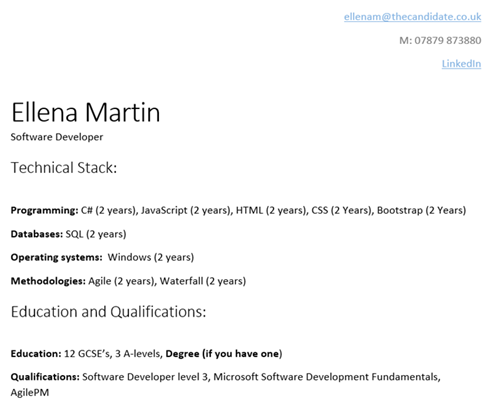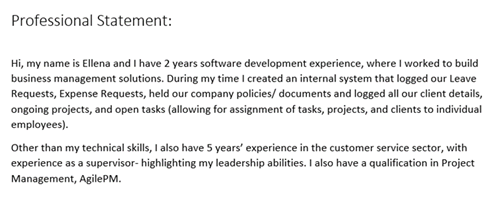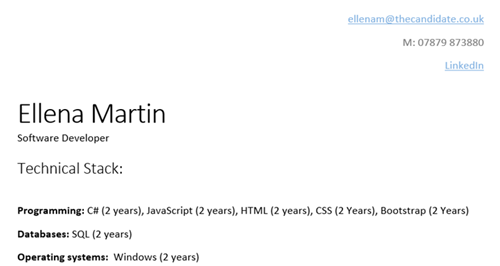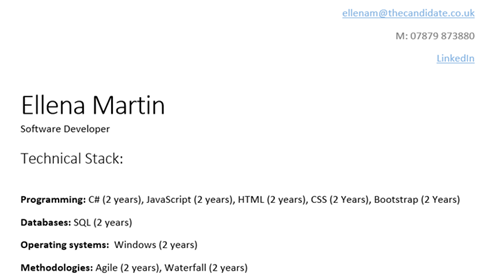Don’t forget to include courses and qualifications
When thinking on what qualifications you should include, you need to think about time and relevance- if you’re 5+ years away from your GCSE’s, then it’s most likely unnecessary to include them; however, any technical degree should always be added regardless of time.
Evidence of ongoing learning and development, however, is more significant than academic credentials. List any relevant courses you've completed in the recent five to ten years, whether they were internal or earned you an outside credential. A little name-dropping on a CV never hurt anyone, especially if any references come from reputable companies like Microsoft or ISEB!
I would recommend putting this under your tech stack:

Balance technical experience with your additional skills
You should think about how you can demonstrate your skills such as leadership, collaboration, and project management to supplement your technical expertise.
Communication skills are particularly important to highlight on your technical CV- maybe you’re good at conveying technical jargon to non-technical colleagues, deliver confident and engaging presentations, or collaborate effectively with other departments.
Describe the effect a project you oversaw had on the business, or, if you've saved money or cut costs, mention how much- same for any processes that you’ve implemented to improve efficiency. This type of information will impress more than excessive technical detail because it demonstrates how you have given value to the company.
Something short and sweet like this should do in your personal/ professional statement, you can then go into more detail under the relevant role:

Back up your accomplishments with evidence
Including your professional accomplishments is an important part of a successful resume, but just listing them isn't enough. You should also back them up with evidence.
Give the statistics if you've increased a website's load time. If you've decreased a website's monthly visitor count significantly, describe your strategy, and provide any pertinent data. In general, laying out work tasks and responsibilities is significantly less instructive (and a poorer reflection of your skills) than mentioning successes.
The bottom line: Don't downplay your accomplishments. Praise your professional achievements and be precise about how you attained them. Your potential employer will get an excellent understanding of how you can use your skills to their benefit by hearing about and supporting your own victories.
Show you’re up to date
Because new technologies are being developed constantly, the IT sector is seen by many as the fastest changing industry. Make sure to go over your resume every year to remove any out-of-date skills and technology and to add any new ones. You don't want to come out as uninformed in such a dynamic field.
Adjust your CV according to the job posting
Read the job postings carefully to find out what the company is looking for, then customize your technical resume. Pick important keywords and include them; many large companies use computer programs to screen resumes before a human sees them and sing the right keywords will increase your chances of getting through the first review.
When listing skills, check the job description for the role you're interested in. Customize the skills section to reflect how your experience aligns with that particular role. You may not have worked the exact role in question, but some of the skills you learned throughout your career, such as learning programming languages, implementing training software, and using database frameworks, could be applied to the position you are applying for. There is a nature. for.
This requires a little extra effort, but the return on investment can be huge.








